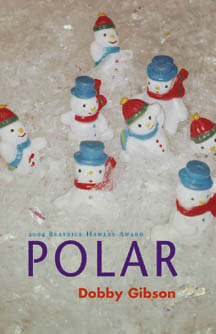Dobby Gibson’s “Polar”: Grab That Line and Hold On
Erin Marsh read Dobby Gibson's "Polar" and was swept away; so much so, she sought out Gibson for a conversation before writing this review.

Reading Dobby Gibson’s first collection of poetry, Polar (on Alice James Books, $13.95), I found myself in the throes of a love affair – with his creative processes and the vibrant, often sobering conclusions he reaches. Gibson’s poems have warp-speed momentum that carries you through them, leaving you dizzyingly changed, his truths let loose in your brain. I met with Mr. Gibson to ask him some questions about his creative life and having his first book published – his answers are as quirky and revealing as his poems.
The quality that first stands out in reading Gibson’s poetry is that each poem must be read as a whole. One cannot tease apart each line in hopes of finding the heart of it. Each line leads into the next, furthering our journey toward a certain and clear-minded conclusion. Thus each poem is an experience, leading the reader to wonder if the poet himself even knows which direction a poem will take. Gibson finds a poem “a failure” if the conclusion doesn’t surprise him, which led me to ask about his creative process.
Gibson wrote the poem “Great Plains” by inserting a roll of adding machine tape into the typewriter set up on his dresser (a method used by the poet A. R. Ammons). Over the course of two or three weeks, Gibson would walk past the typewriter, writing in 30-second bursts. This method enabled him to “break the ceremony” of writing, which can sometimes be daunting. Following are the first few lines of “Great Plains”:
Gibson wrote most of the poems in Polar while working sixty-hour weeks at a corporate job. He claims he was able to compartmentalize his poetry world and his working world, but there are some stunning images of corporate life to be found in this collection. For instance, in poem VIII from his series of poems titled “Solstice” Gibson writes: “The city is calling us every name / in the book if at all from behind / its anonymous precincts of office-tower glass.” Another is from the poem “Gone Before”: “the dreamers, like secretaries, / are sent home in sneakers, carrying their pumps.”
The poems in this collection appear to be written by someone who had a formal education in poetry. However, it is interesting to note that Gibson received his MFA from Indiana University in fiction. He says he started writing poetry “to rebel against what I was supposed to be doing” and has not written a word of fiction since he graduated.
Gibson’s poems seem to arise from a certain tension or argument that comes naturally to him. For instance, in the title poem, “Polar”, Gibson writes:
Although the poetic arguments in Gibson’s poems do not make traditional sense, the reader jumps from point to point, making the connections with the poet as we are brought into his singular, astute imagination. The reader latches onto these poems like a man hopping a train, and must be prepared to move as quickly. There is no time to mull these poems over; one must take the initial reaction and let it go, because we find ourselves already in the next poem.
Reading this collection of poems is entering into an intimacy with the author and he leaves us breathless, better knowing parts of ourselves only revealed in the brief quiet moments found in the middle of our frantic lives.